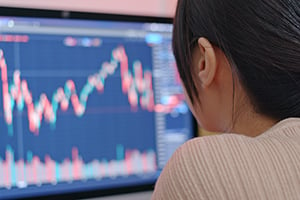 Today’s post is going to be a short one because there is simply too much uncertainty right now to make a principled argument about pretty much anything. Interest rates have bounced back up to levels above 2 percent. Will they stay there? Depends on what happens in Ukraine. Stocks are staying somewhat below, but not far below, where they were when the invasion started. Will they go up or down? Pretty much depends on what happens in Ukraine. Oil prices, consumer confidence, inflation, and so forth are all pretty much the same story. We are all waiting on events.
Today’s post is going to be a short one because there is simply too much uncertainty right now to make a principled argument about pretty much anything. Interest rates have bounced back up to levels above 2 percent. Will they stay there? Depends on what happens in Ukraine. Stocks are staying somewhat below, but not far below, where they were when the invasion started. Will they go up or down? Pretty much depends on what happens in Ukraine. Oil prices, consumer confidence, inflation, and so forth are all pretty much the same story. We are all waiting on events.
Some Positive Signs
But what is especially interesting is that this reaction is, given what we know, a positive outcome. Most of the geopolitical discussion is depressing, bordering on the apocalyptic. There was a missile strike close to the Polish border, and responsible people are talking about tactical nuclear weapon usage. Reading the headlines, you would expect the market to be down by much more than it is. The combination of military risks, energy and materials shortages, pending food crises around the world, and so on should, in theory, have taken markets much lower. Yet here we are.
If you take markets seriously as predictors of the future (as I do), this is a very positive sign. Investors are reading the headlines and concluding that however bad things get—and they are very bad for the Ukrainians—that we will survive this and even continue to thrive. That the worst-case outcomes are much less likely than the headlines suggest. That the best-case outcomes are perhaps more likely than anyone now thinks. And that the world is not coming to an end.
Don’t get me wrong. Lots of things could and no doubt will go wrong. The crisis is likely to get wider and more severe before it gets better. Even after the Ukraine invasion is resolved, the world will not be returning to antebellum conditions for years, if ever.
The Power of the Free World
But as we saw in the pandemic, the ability of people and economies to adapt to extreme conditions is nothing short of extraordinary, especially in the free world. The U.S., in particular, adapted and thrived despite some of the worst Covid-19 exposure in the world. Our recovery and expansion are both more advanced and stronger than anywhere else. That will continue no matter what happens in Europe.
Europe itself will face more severe challenges. It is more exposed to Russia militarily, is more exposed to energy market disruption, and has inferior demographics (i.e., an older and slower-growing population, which slows down economic growth). But Europe also has free markets and an ability to adapt. They have allies around the world—especially the U.S., also a major energy producer. The Ukrainian refugees, in a worst-case scenario, might stay in Europe—and help with its demographic problems. In other words, out of evil can come good. That does not excuse the evil, of course. But looking at the long run, it also means the end of the world is very likely to be postponed once more.
Listen to the Markets
And that is what we can take from the markets’ response to the current crisis. Markets have a good record not of predicting the future but of ruling out a range of outcomes. Right now, they are telling us the likelihood of the worst case is low. For someone who is nervous about what could happen (like me), this is reassuring.
Listen to the markets. Lots of things could happen, but most of them won’t. Keep calm and carry on.


 Print
Print

